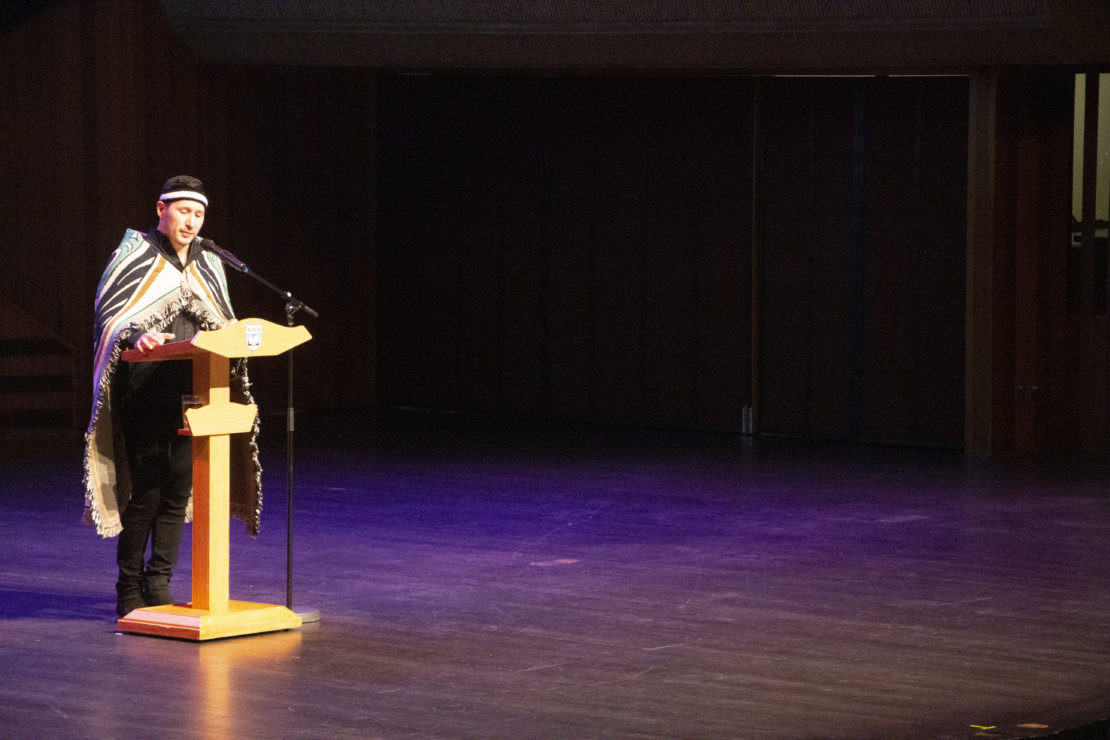Vancouver musician Francis Arevalo also presents on how music helped him through the mania of bipolar disorder

A month after it was postponed by a snowstorm that brought campus, as well as parts of Victoria, to a standstill, the keynote showcase of UVic’s sixth annual Wellness Week went ahead on a mercifully snow-free Feb. 12 inside Farquhar Auditorium. The showcase was hosted by CBC broadcast journalist and UVic Chancellor Shelagh Rogers and featured presentations from former NHL player Jordin Tootoo and Vancouver musician Francis Arevalo.
To open the showcase, Rogers detailed her own struggles with depression. She told the crowd that when she first sought an explanation for her periods of depression in college, the campus doctor explained her lethargy away as hormonal issues. It took her until 2003 for her to be properly diagnosed, and she talked about the importance of keeping those who are supportive close to you and letting those who aren’t remain at a distance.
“I have in my mind kind of created a dresser drawer of friendships,” Rogers said. “You can edit your friendships so that you are with people who really support you and be with the good friends that you can count on every day.”
The first presentation was given by Arevalo, who discussed his battle with bipolar disorder and mania, and how music helped him through the toughest year of his life. He talked about how in December 2014, while studying at UBC, he was prescribed antidepressants for depression which, when combined with bipolar disorder, sent him into a downward spiral of hypo-mania. He talked about how he got kicked out of his dorm, lost his job, gave away all of his belongings, had a hallucination of talking to Colonel Sanders from KFC, and eventually ended up being hospitalized in a psychiatric ward in April.
Following a month spent in the hospital, Arevalo was released. He discussed going through a year of depression, during which he gained 100 pounds and suffered memory problems. This all changed for Arevalo when, on April 27, 2016, the first anniversary of his hospitalization, he decided to make a change.
“If you’re going to keep going through life, you’re going to live as intentionally, as committed, and as passionately as you can,” Arevalo said he told himself. Since then, he said he’s been diligent with his medication, gone to counseling and therapy, and overall rebuilt the life and the friendships he had before his mania.
For Arevalo, music has provided a form of therapy and he urged people to find their own inspiration to pick themselves up when they are down, and to seek help from others.
The tagline of Wellness Week was “there’s a place for you here,” through which the university hoped to convey that resilience can be obtained in many different ways. The rebranding of the initiative from “Mental Health Awareness Week” to “Wellness Week,” was done in order to reduce the stigma that comes with the term “awareness” and reach audiences that might be more reluctant to have conversations surrounding mental health.
This was why the organizers asked Jordin Tootoo to give the keynote address. His experience as the first Inuit member of the NHL coupled with his history dealing with the suicide of his brother Terence which led him down the path of depression and alcoholism, for which he is now nine years sober, made him suited to reaching a wider audience, particularly amongst Victoria’s Indigenous youth.
During his speech, Tootoo discussed how, to dull the pain of his brother’s death, he drowned himself in women and alcohol, as well as the mentality that money was all that mattered in life. Following six to seven years of this, his coach Barry Trotz and general manager David Poile intervened in 2010 and sent him to a rehab centre in California. Through this, he was able to confront the anger, guilt, and sorrow that had followed him since the morning after his last night with Terence.
One key aspect of his recovery was reconnecting with the land, which as an Indigenous person formed the basis of his childhood growing up in Rankin Inlet, Nunavut. His wife and daughters have given him a new lease on life and helped his healing. He has also worked to give back to his community, as well as others across Canada, through talks, his book All the Way: My Life on Ice, and through the Team Tootoo Fund which gives funding to non-profits working to raise mental health awareness and suicide prevention.
“We all fight a fight no one knows about,” Tootoo said in an interview with the Martlet. “It doesn’t matter where you come from, healing is possible.”
Tootoo spoke about how the cycle of depression and suicide that afflicts many communities in Canada, particularly amongst Canada’s Indigenous peoples, needs to stop and that will only happen by providing people spaces to communicate and not worry about stigma or social norms.
“[Help] starts within our communities,” Tootoo said. “The cycle that affects many of us, can stop with us.”






